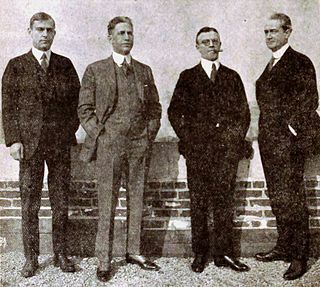A Quote by Michael Gruber
Professors go batty too, perhaps more often than other people, although owing to their profession, their madness is less often remarked.
Related Quotes
It is often sadly remarked that the bad economists present their errors to the public better than the good economists present their truths. It is often complained that demagogues can be more plausible in putting forward economic nonsense from the platform than the honest men who try to show what is wrong with it.
There are so many kinds of madness, so many ways in which the human brain may go wrong; and so often it happens that what we call madness is both reasonable and just. It is so. Yes. A little reason is good for us, a little more makes wise men of some of us--but when our reason over-grows us and we reach too far, something breaks and we go insane.
In the transfer society, the general public is not only poorer but also less contented, less autonomous, more rancorous, and more politicized. Individuals take part less often in voluntary community activities and more often in belligerent political contests. Genuine communities cannot breathe in the poisonous atmosphere of redistributional politics.
We may put too high a premium on speech from platform and pulpit, at the bar and in the legislative hall, and pay dear for the whistle of our endless harangues. England and especially Germany, are less loquacious, and attend more to business. We let the eagle, and perhaps too often the peacock, scream.
It may be no less dangerous to claim, on certain occasions, too little than too much. There is something captivating in spirit and intrepidity, to which we often yield as to a resistless power; nor can we often yield as to a resistless power; nor can he reasonably expect the confidence of others who too apparently distrusts himself.
Within the universe of the extraordinary, those qualities we designate to human concepts of gender are often shared, exchanged, or even completely obliterated. Because of this mixture of traits, these twins called Genius and Madness often appear to be the same thing. They both have a tendency to blur the lines of what we call norms, or established reality. They both, when we study that grand tapestry known as history and modern-day society, tend to stand out in much bolder relief than other figures. -- from Dancing with Madness, Dancing with Genius
Man is said to be a reasoning animal. I do not know why he has not been defined as an affective or feeling animal. Perhaps that which differentiates him from other animals is feeling rather than reason. More often I have seen a cat reason than laugh or weep. Perhaps it weeps or laughs inwardly - but then perhaps, also inwardly, the crab resolves equations of the second degree.
The more often we see the things around us - even the beautiful and wonderful things - the more they become invisible to us. That is why we often take for granted the beauty of this world: the flowers, the trees, the birds, the clouds - even those we love. Because we see things so often, we see them less and less.


































